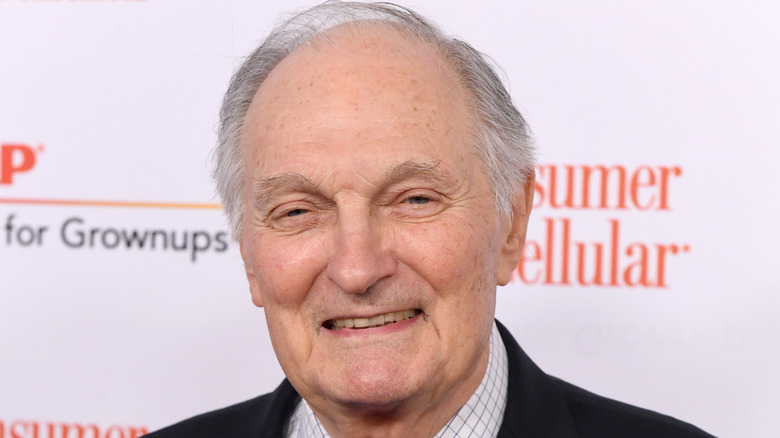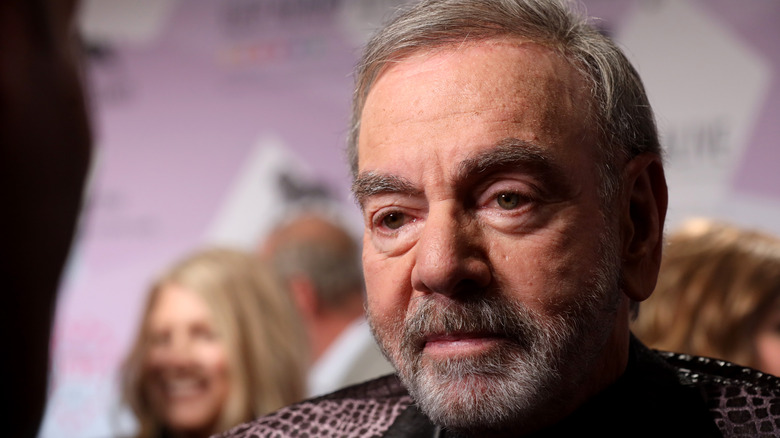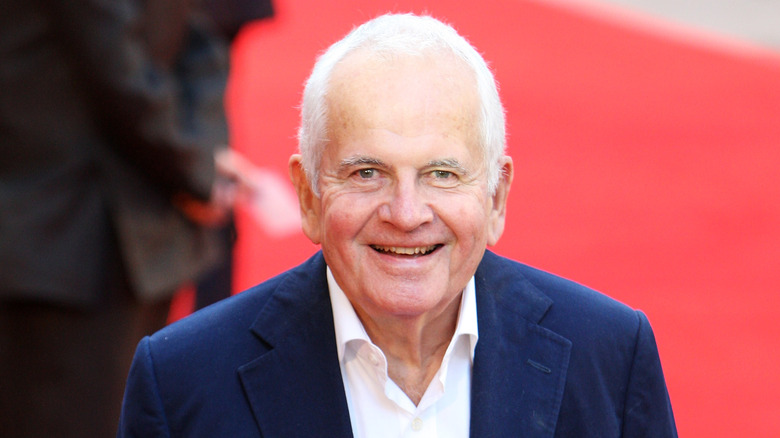Celebrities You Never Knew Had Parkinson's Disease
Parkinson's disease is a degenerative condition that affects the dopamine-producing neurons in the brain. Most commonly, slowed movements (bradykinesia), tremors, balance issues, and muscle stiffness are the symptoms of Parkinson's disease, but the condition manifests in other ways too, such as loss of automatic movements like blinking or smiling, issues with writing, trouble swallowing, loss of your sense of smell, depression, and trouble with thinking and focusing. While the exact cause of Parkinson's disease is unknown, certain things like your genes, age, sex (there's typically a higher prevalence among men), and exposure to toxins are thought to be related to the condition.
If you were to google the health condition, you may have come across "Back to the Future" star Michael J. Fox's history with Parkinson's disease. After revealing his diagnosis when he was 29 back in 1991, the actor launched the Michael J. Fox Foundation for Parkinson's Research in 2000. Describing the disease as a "gift that keeps on taking," the "Family Ties" actor told CBS Sunday Morning that every day is a challenge. "All these subtle ways that get you, you don't die from Parkinson's, you die with (the condition). I'm not going to be 80. I won't be 80."
Fox isn't the only celebrity with this incurable disease. In fact, professional basketball player Brian Grant, boxer and activist Muhammad Ali, stand-up comedian and actor Richard Lewis, and evangelist Billy Graham were diagnosed with Parkinson's too. Here's a list of some other celebrities you never knew had Parkinson's disease.
Alan Alda: 'Life is adapting, adjusting and revising'
Actor, author, screenwriter, and podcast host Alan Alda revealed he has Parkinson's disease in 2018 when he appeared on CBS This Morning, although the "M*A*S*H" star had been diagnosed with the condition three and a half years prior. "I've had a full life since then. I've acted, I've given talks, I help at the Alda Center for Communicating Science at Stony Brook. I started this new podcast [Clear+Vivid]," said the "Four Seasons" actor.
In a 2020 interview with People, Alda shared that he is doing everything he can to slow the progression of the disease, but simple things like tying shoelaces with stiff fingers can be challenging. "The silver lining is that I keep getting more confident that I can always find a workaround," added the "Marriage Story" actor. He also shared that the illness has made him realize that life is about adapting, adjusting, and revising.
Parkinson's affects about 1% of people over 60 worldwide and is the most common movement-related brain disease, per the Cleveland Clinic. Even though there's no cure, treatment to manage symptoms, like medication and sometimes surgery, can help a person diagnosed with the condition live life the best they can. Alda said that a typical day in his life includes exercising, prepping for his podcast, "chasing the geese off my grass, playing chess with Arlene [his wife with whom he has three childre] and bingeing on Scandinavian TV series. Pretty much what everyone does."
Neil Diamond: 'I have to make the best of it'
Singer-songwriter Neil Diamond, best known for his hits "Sweet Caroline" and "Forever in Blue Jeans," told CBS Sunday Morning that accepting his Parkinson's disease diagnosis has been a work in progress but he's learning to do it. "Okay, so this is the hand that God's given me, and I have to make the best of it, and so I am," said the celebrity.
Diamond was diagnosed with the brain disease in 2018 and revealed that he can still sing. "It's like, all the systems in my mind and my body are working as one when I'm singing. And it's a great feeling," explained the "I Am ... I Said" musician, who announced his retirement from touring that same year due to the diagnosis.
The stages of Parkinson's disease are classified based on severity and include early or preclinical phases and advanced clinical phases. In stage one, Parkinson's manifests in mild symptoms like tremors and motor issues on one side of the body, but the degeneration of dopamine producing neurons has already set in. Stage two could come with symptoms affecting both sides of the body, and stage three is when a person's motor skills worsen and falls become common. At stage four, symptoms have fully developed, and although severely disabling, a person might still be able to walk with the assistance of a cane. The stiffness in your legs can be so severe at stage five that walking becomes impossible.
Diamond shared that he is taking life as it comes and is grateful for the life he's had.
Davis Phinney thinks positive affirmations help deal with the disease
Professional road bicycle racer, Olympic Bronze medalist, and Tour de France stage winner Davis Phinney was diagnosed with young onset Parkinson's disease (YOPD) in 2000. YOPD is when Parkinson's is diagnosed in someone under 50 years of age. While disease symptoms and treatment more or less remain the same, people with YOPD appear to have a slower progression of the disease over time and tend to remain cognitively and functionally intact for longer.
Phinney, who is a big advocate for exercise — even just "walking up the stairs in your apartment" – when it comes to managing the symptoms, takes a positive approach while dealing with his diagnosis. "Instead of saying something negative, even if you say [that] you're trying your best ... within your own mind, if you're positive and keep an upbeat attitude, that's an important part of staying well and enjoying your life," shared the retired athlete via the Davis Phinney Foundation for Parkinson's, a venture he launched in 2004.
At least 50% of people with the degenerative brain condition will also experience depression as a symptom, per the Parkinson's Foundation. The imbalance in dopamine resulting from the disease can take a toll on someone's mental health. While selective serotonin reuptake inhibitors (SSRIs) and anti-depressants can be used to treat depression, exercise is also recommended to help with this particular symptom. "Our role as people with Parkinson's is not to let the disease win, if we at all can help it," added Phinney (via Parkinson's Disease WISE).
Janet Reno's brave battle with Parkinson's
Former United States attorney general Janet Reno was diagnosed with Parkinson's in 1995. Reno, who died at age 78 of complications related to Parkinson's in 2016, did not let the disease define her. Former health and human services secretary Donna E. Shalala, who served with Reno, shared (via The New York Times), "She never wanted to talk about that. Janet was at her best talking about justice and fairness and equity and human rights. Those are the things she cared deeply about."
Reno was diagnosed two years into her tenure and completed her term in office. She even ran a bid (albeit, unsuccessful), for governor of Florida seven years after her diagnosis. She had a desire to raise money for the cause and be a spokesperson for Parkinson's.
In a May 2001 interview with Neurology Today, the Miami native shared that she didn't try to hide her symptoms. "My tremors used to concern people but now I think everyone has gotten used to them. I still hike and go kayaking and I'm very active ... It's only my very hectic schedule, and not Parkinson disease, that keeps me from doing all the things I like to do," she added. The lawyer and public official first noticed symptoms of the condition while on her morning walks around the Capitol, she told Neurology Now. Faint twitches and tremors eventually led her to seek her doctor's advice, who asked her questions, examined her, and told her she had Parkinson's.
Ian Holm: A private journey with Parkinson's disease
Much loved for his character of Bilbo Baggins in "The Lord of the Rings" trilogy, Ian Holm's journey with Parkinson's was private, to say the least. It is unclear when exactly the actor was diagnosed with the condition, but according to director Peter Jackson, it was the reason why he didn't reprise his role in "The Hobbit" trilogy as a younger Bilbo Baggins. Martin Freeman played the role. "He had difficulty walking, and certainly couldn't travel to New Zealand. Always a private man, he told us that he'd basically retired, but wasn't announcing it," Jackson shared of the celebrity (via The Wrap).
Holm died of complications related to the disease at age 88, leaving behind his wife Sophie de Stempel and five children from earlier marriages. Although Parkinson's itself doesn't cause death, the health condition can make people vulnerable to other life-threatening infections. A person with Parkinson's could also die of injuries related to a fall, the latter of which is a common risk associated with the postural instability that comes with Parkinson's. Pneumonia is another common cause of death for people with Parkinson's. Difficulty swallowing can lead to aspiration and related pneumonia complications, which can result in death in people with late-stage Parkinson's.
Now that you know all about these celebrities with Parkinson's, perhaps you'd like to check out Health Digest's celebrities who were diagnosed with life-threatening diseases.





